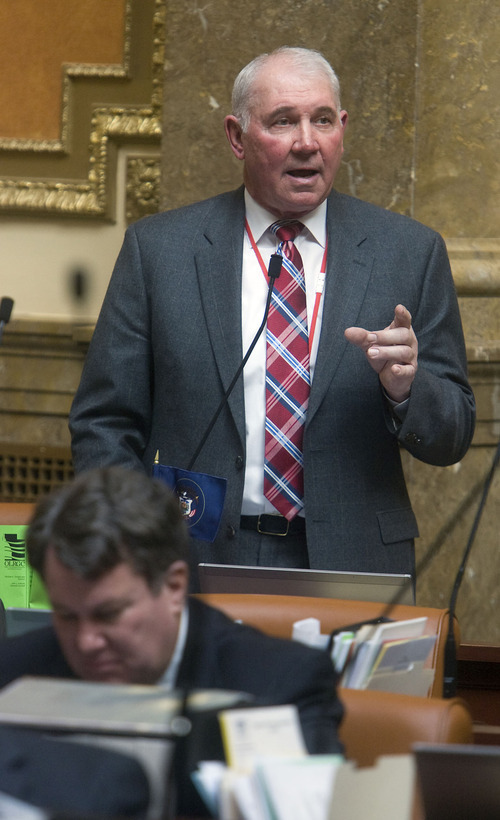This is an archived article that was published on sltrib.com in 2011, and information in the article may be outdated. It is provided only for personal research purposes and may not be reprinted.
A deal between the House and Senate resolved itself dramatically late Friday night when both chambers passed immigration measures — an enforcement-only bill and a guest-worker bill — giving Gov. Gary Herbert a chance to sign a comprehensive series of proposals.
But the key player in the deal — Rep. Stephen Sandstrom, R-Orem — was disgusted when it was all over and said the vote to pass a comprehensive guest-worker bill was "a tragedy."
Standing outside the House Chamber after 10 p.m. eating a cold hamburger, Sandstrom said that while the deal hinged on his tempering language in his immigration bill, the passage of Rep. Bill Wright's guest-worker proposal, HB116, put Utah at risk and seemed to suggest that it would've been better not to have had the deal. Sandstrom voted against the Wright bill, knowing if it went down his bill would as well.
"I think the status quo would've been better," Sandstrom said. "This is an absolute tragedy for the state of Utah. We have opened the floodgates for illegal aliens."
Ally Isom, spokeswoman for the governor, said, Herbert "is pleased with the Legislature's efforts to craft a Utah solution." However, she said he would not indicate if he would sign the legislation.
Sandstrom had a roller coaster day, with his bill having an uncertain fate early when he was forced to delay voting on HB497 because he was still amending it. He had spent the week talking to Republican leaders on both sides of Utah's Capitol and had to remove the words "reasonable suspicion" from his bill to allow it to be considered by the Senate.
When he made the final changes, it sailed through the House easily 59-15 with no debate.
Throughout the day, it appeared the deal was imminent and the Senate passed Sandstrom's HB497 through 22-5, also without much discussion.
But when HB116 passed the Senate with amendments 21-7 and was sent over to the House, the House sent it back and rejected the amendments that dealt with repealing in-state tuition for undocumented students.
Rep. Carl Wimmer, R-Herriman, was running his own bill repealing in-state tuition and thought the language in the Wright bill trumped his. When he saw that, he thought the House should kill it.
Rep. Chris Herrod, who saw Sen. Curt Bramble in the House hallway, told him: "I'm going to kill the bill," he said, referring to HB116.
Bramble stormed off and said the Senate would do the same to Sandstrom's bill.
Sandstrom's bill, HB497, gives local law enforcement the option to check legal status of people detained for class B or C misdemeanors, distancing it from the stigma of Arizona's SB1070 law that required local police to check legal status of those suspected of any crime.
It also puts into place a mechanism where anybody who attempts to collect public benefits with a fake Social Security number shall be reported to local police and, if they are arrested on fraud — a felony — their legal status can be checked.
Similar elements were in the Wright bill, but Sandstrom's bill holds a supremacy clause, trumping enforcement language in other legislation. That was a necessary part of the deal, largely orchestrated by Bramble.
Bramble originally held the comprehensive guest worker bill but decided to let others carry it because he believed both he and his bill had become too controversial for it to pass the House. The bill carried in it a guest worker program to be run by the Department of Public Safety and would charge undocumented immigrants $2,500 to apply for a permit — $1,000 if they overstayed a visa.
The undocumented worker could pay through installments and would also be eligible to bring family members with them. It didn't require them to learn English, but they were subject to background checks and would have to have medical insurance.
Taxes would be collected through the Tax Commission while the state waited for a federal waiver — something Sandstrom and other critics believe will never come.
When it finally got to the House after the last-minute blow-up, several House members tried to sway votes against it.
"This isn't just an open door," Rep. David Clark, R-Santa Clara, said. "This is the barn door."
But Senate Minority Leader David Litvack, D-Salt Lake City, said in his 11 years in the House, the Wright bill was a great piece of legislation that addressed multiple facets of a complicated issue.
"I have also said that if we are going to take on this issue, and we're going to try and be a lead in this country on how to address it, then let's do it in a holistic way. Let's do it in a comprehensive way and let's do it in a way that respects all people involved," he said. "It is an honor to stand in support."







